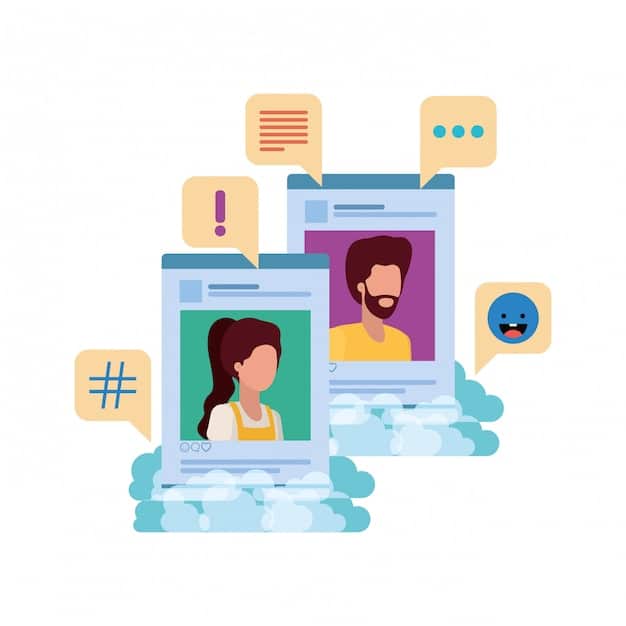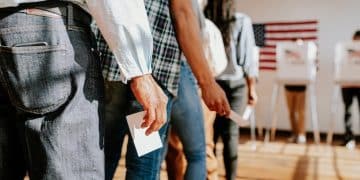Social Media’s Impact: US Political Discourse in the Last 3 Months

Social media has dramatically reshaped US political discourse in the last three months by accelerating news cycles, amplifying polarized viewpoints, and fostering direct engagement between politicians and citizens, leading to both increased participation and heightened social division.
How has social media reshaped US political discourse in the last 3 months? The answer is complex and multifaceted, with profound implications for the future of American democracy.
The Acceleration of News Cycles
Social media has undeniably accelerated the pace at which news and information spread. What used to take hours or even days via traditional media now unfolds in real-time across platforms like Twitter, Facebook, and Instagram.
This speed can be both advantageous and problematic. On one hand, it allows for rapid dissemination of critical information, enabling citizens to stay informed about pressing issues as they develop. On the other hand, it contributes to a culture of constant reactivity, where nuanced discussion is often sacrificed for immediate, attention-grabbing takes.
The Impact on Political Campaigns
Political campaigns have adapted to this rapid news cycle by leveraging social media for immediate responses to events. Candidates can now address criticisms, launch counter-narratives, and mobilize supporters in a matter of minutes, bypassing traditional media gatekeepers.
Challenges of Verifying Information
The speed of social media presents challenges in verifying the accuracy of information. False or misleading stories can spread rapidly, influencing public opinion before they can be effectively debunked.
- Increased Pressure: Politicians are under constant pressure to respond to every development.
- Reactive Narratives: Political narratives are often shaped by immediate reactions rather than long-term strategies.
- Challenges for Fact-Checkers: Fact-checkers struggle to keep up with the volume of misinformation.
The acceleration of news cycles has fundamentally altered how political information is consumed and disseminated, with both positive and negative consequences for US political discourse.

Amplification of Polarized Viewpoints
Social media platforms tend to create echo chambers and filter bubbles. Algorithms are designed to show users content that aligns with their existing beliefs, reinforcing their viewpoints and limiting exposure to opposing perspectives.
This phenomenon has significant implications for political discourse, as it can lead to increased polarization and a lack of understanding between different ideological groups.
Algorithmic Echo Chambers
Algorithms on platforms like Facebook and YouTube prioritize content that generates engagement, often favoring inflammatory or divisive material. This can create feedback loops where users are increasingly exposed to extreme viewpoints.
Impact on Political Identity
Social media can strengthen political identity by providing spaces for like-minded individuals to connect and reinforce their beliefs. This can lead to increased political activism but also greater intolerance of opposing viewpoints.
- Reinforcement of Preexisting Beliefs: Users are primarily exposed to content confirming their views.
- Increased Polarization: Limited exposure to diverse perspectives exacerbates divides.
- Reduced Empathy: Echo chambers make it harder to understand and empathize with those holding different beliefs.
The amplification of polarized viewpoints on social media has created a more fragmented and contentious political landscape in the US.
Direct Engagement Between Politicians and Citizens
Social media enables politicians to engage directly with their constituents, bypassing traditional media outlets. This can foster a sense of connection and accountability but also raises concerns about the nature of online interactions.
Politicians use these platforms to announce policies, respond to criticisms, and solicit feedback from the public. This direct engagement has the potential to democratize political discourse, but it also requires careful management and a commitment to respectful dialogue.
Benefits of Direct Communication
Direct engagement can make politicians more accessible and responsive to the needs of their constituents. It also allows them to control their own narratives and bypass potentially biased media coverage.
Challenges of Online Toxicity
Social media can be a breeding ground for online toxicity, including harassment, personal attacks, and misinformation. Politicians and citizens alike can be targeted by these behaviors, which can discourage participation and undermine constructive dialogue.
Direct engagement between politicians and citizens presents both opportunities and challenges for the health of US political discourse.

The Spread of Misinformation and Disinformation
The proliferation of fake news and disinformation on social media is a major concern for US political discourse. False or misleading stories can spread rapidly, influencing public opinion and eroding trust in legitimate news sources.
Foreign actors have also used social media to spread disinformation and interfere in US elections. These campaigns often seek to sow discord, amplify existing divisions, and undermine confidence in democratic institutions.
The Role of Bots and Trolls
Automated bots and troll accounts can be used to spread propaganda, amplify disinformation, and harass political opponents. These accounts often operate anonymously, making it difficult to trace their origins and hold them accountable.
Strategies for Combating Misinformation
Combating misinformation requires a multi-faceted approach, including media literacy education, fact-checking initiatives, and platform accountability. Social media companies have a responsibility to identify and remove false or misleading content, but this process must be balanced with concerns about free speech and censorship.
- Combating Disinformation: Requires media literacy, fact-checking, and platform accountability.
- Foreign Interference: Foreign actors spread disinformation and interfere in US elections.
- Erosion of Trust: Fake news erodes trust in legitimate news sources.
The spread of misinformation and disinformation poses a serious threat to the integrity of US political discourse.
The Impact on Political Participation and Mobilization
Social media has made it easier for citizens to participate in political activities and mobilize around specific issues. Online platforms can be used to organize protests, raise money for campaigns, and share information about political events.
This increased participation has the potential to empower marginalized communities and amplify voices that might otherwise be excluded from the political process. However, it also raises concerns about the nature of online activism and its impact on real-world outcomes.
The Power of Online Activism
Social media has been instrumental in organizing movements like Black Lives Matter and the Women’s March. These movements have used online platforms to mobilize supporters, raise awareness, and coordinate actions.
Limitations of Online Engagement
While social media can be a powerful tool for political mobilization, it’s important to recognize its limitations. Online engagement does not always translate into real-world action, and some critics argue that it can create a false sense of participation.
The impact on political participation and mobilization is a complex and evolving aspect of social media’s influence on US political discourse.
Social Media and the Changing Nature of Political Debate
Social media has fundamentally altered the nature of political debate in the US. The emphasis on brevity, immediacy, and emotional appeals has led to a decline in reasoned discourse and a rise in personal attacks and inflammatory rhetoric.
This can make it difficult to engage in productive conversations about complex issues. The focus on soundbites and viral moments often overshadows substantive policy debates and nuanced analyses.
The Rise of Soundbite Politics
Politicians are increasingly incentivized to communicate in short, memorable soundbites that can be easily shared on social media. This can lead to oversimplification of complex issues and a focus on emotional appeals rather than rational arguments.
The Decline of Civility
The anonymity and lack of face-to-face interaction on social media can contribute to a decline in civility and respect in political debate. Personal attacks, harassment, and inflammatory rhetoric are common, making it difficult to engage in constructive dialogue.
- Brevity and Immediacy: Emphasis on short, quick content diminishes reasoned discourse.
- Simplified Issues: Complex topics are often oversimplified into easily digestible soundbites.
- Anonymity: Lack of face-to-face interaction amplifies incivility and online harassment.
Social media has significantly reshaped the nature of political debate in the US, often to the detriment of reasoned discourse and civil engagement.
| Key Aspect | Brief Description |
|---|---|
| ⚡Speed of News | News spreads faster, but verification becomes challenging. |
| 📢Polarization | Echo chambers amplify extreme views, widening political gaps. |
| 🗣️Direct Engagement | Politicians communicate directly with citizens, but toxicity rises. |
| 🚫Misinformation | False news erodes trust and influences public opinion. |
Frequently Asked Questions
▼
Social media platforms allow for the instantaneous dissemination of news, bypassing traditional media outlets. This speed can be beneficial for quick updates but also problematic due to the rapid spread of misinformation.
▼
Echo chambers are environments where individuals are primarily exposed to information that confirms their existing beliefs. This phenomenon is exacerbated by algorithms that prioritize content based on user preferences, reducing exposure to diverse perspectives.
▼
Direct engagement allows politicians to communicate directly with constituents, bypassing traditional media channels. While promoting accessibility, it also invites toxicity, misinformation, and creates challenges related to managing online interactions.
▼
Misinformation can quickly spread and deeply influence public opinion, potentially swaying elections and eroding trust in credible news sources. Bots and trolls facilitate the spread of misleading content, further complicating efforts to maintain factual accuracy.
▼
Social media’s fast-paced environment favors brief snapshots and emotional appeals which often oversimplify complex issues. This trend leads to a decline in high-quality debate, accompanied by increased personal attacks hindering productive conversations about policies.
Conclusion
In conclusion, social media has profoundly reshaped US political discourse in the last three months by accelerating news cycles, amplifying polarized viewpoints, fostering direct engagement, spreading misinformation, impacting political participation, and altering the nature of debate. These changes present both opportunities and challenges for the future of American democracy, requiring critical engagement and proactive strategies to promote informed and constructive dialogue.





